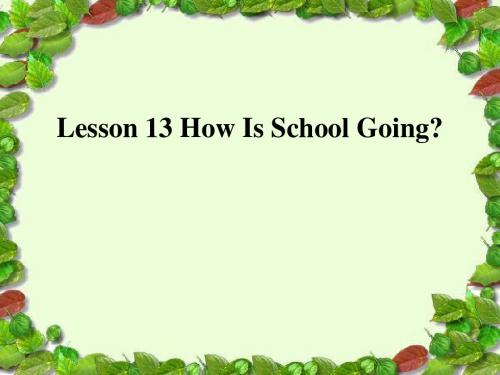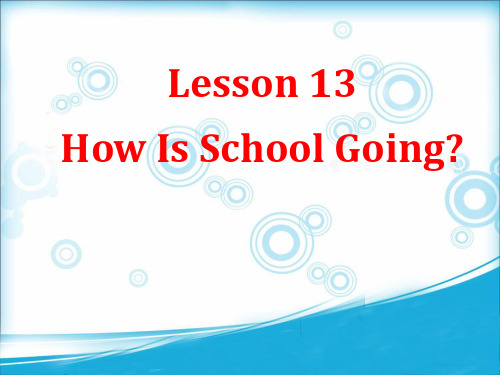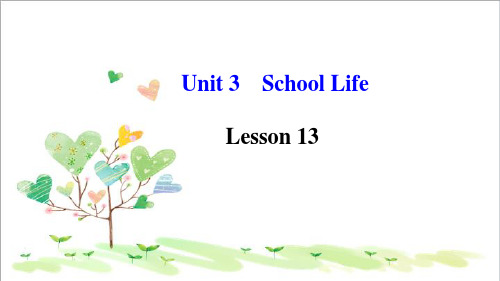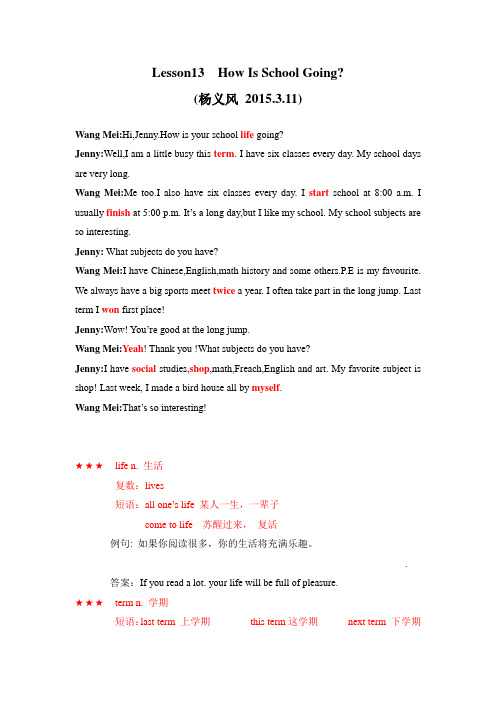Unit 3 Lesson 13 how is school going
七下Lesson13

(4)Jenny has __s_o__c_ia_l__ studies, shop, math, French, English and art.
Read and finish Exercise 2 in Let’s Do It. (1)How is Jenny’s school life going?
=Danny _d_o_e_s_w_e_l_l_in__d_r_a_w_i_n_g_.
st week,I made a bird house all by myself. myself 我自己,yourself你自己,
himself他自己,herself她自己,
itself 它自己,ourselves我们自己,
yourselves你们自己,
themselves他/她/它们自己
by oneself “单独,独自” enjoy oneself 玩的开心 teach oneself 自学
7.I am a little busy this term. be busy doing sth 忙于做...
=be busy with sth Tom's mother is busy_c__o_o_k_i_ng(cook) breakfast for Tom.
__D__o_e_s__she have____a_n_y____good news? 19. I often join in the high jump.(改为同义句)
I often_t_a_k_e____ __p_a_r_t___ __i_n_____the high jump. 20. We had a sports meet last term. (对画线部分提问)
Lesson13_How__is__school__going

• ually为频度副词,意为通常,经常,常用how often提问 • He usually send e-mails to his friends.他经常给他的朋 友发电子邮件。 • 区分:always,usually,often,sometimes,never • Always:总是,一直 为频度较大的副词 • Usually:通常 指很少有例外,频度仅次于always • Often:经常,常常 表示不确定具体s:有时 指偶尔做某事,没有连续性,频 • 度比often小 • Never:从来没有 含义与always相反 • 频度强弱依次是:always>usually>often>sometimes >never
• 6.And与or的用法: • And 的基本意义为“和,又,而”连接并列 的单词、词组、短语或句子,起承上启下的 作用,他所连接的短语属于并列关系,前后 是没有矛盾的。 • Or表示“或者”,也用于连接并列的单词、 词组、短语或句子。
• 7.Interested与interesting: • Interesting含义是令人感兴趣的,有趣的。主 语是物 • Interested含义是感兴趣,对…..感兴趣。含有 被动的意味,主语通常是人,多用于 be/get/feel/become interested in sth 意为对…感 兴趣 • 它的名词形式是interest,意为“兴趣,趣味 ” • The girl shows interest in music. • 这个女孩对音乐感兴趣。 • Interest还可以做动词意为使感兴趣,主语多 为物 • The novel may interest you.那本小说会让你感 兴趣的。
• 4.I start school at 8:00a.m.I usually finish at 5:00p.m.我早晨八点上课下午五点放学。 • Start作动词意为着手,开始,相当于begin,其 后跟to do或doing,意为“开始做。。。。” • How were you when you first started to play/playing the piano?你几岁开始弹琴? • I started learning English when I was 5 years old. 当我5岁时我开始学习英语。
冀教版七年级下册英语unit3 Lesson 13

10.—Hi, Mike! How’sitgoing?
—________ C
A. Goodidea. B. Ithinkso.
C. Notbad. D. Ofcourse.
二、用所给单词的适当形式完成句子
11. Howmany________ (class) classes
doyouhaveinthemorning?
4. Mikeiscrazyaboutstamps.
D
He________collectsstampsfirstwhereverhetravels.
A. neverB. seldomC. sometimesD. always
【点拨】考查频度副词辨析。句意为“迈克着迷于邮票。 无论在什么地方旅行,他总是首先集邮”。never从不; seldom不常; sometimes有时; always总是。故选D。
hday.
A. toB. forC. ofD. at
2.—Jack, youswamverywell. Whotaughtyou?
—Nobody. Itaught_______C_. A. IB. meC. myselfD. mine
3. Shesaysherfavourite______C__isEnglish. A. colourB. sportC. subjectD. project
start
4. Everyonelikesto____w__in__ (赢).
Noonewantstobealoser. 5. Ilearnhowtocookby________ (我自己).
myself
二、根据汉语提示完成句子, 并背记英语句子 6. 你的学校生活怎么样?
lesson13howisyourschoollifegoing

【探究总结】win, beat的用法
• 【学以致用】 • ①她在跳高比赛中获奖了。
• She __w_o_n__ __th_e___ m__a_tc_h__ in the high jump.
• ②I __b_e_a_t _ (win/beat) John at chess yesterday.
•Answer: Great! Pretty good! Everything goes well!
Not bad. Just so so! Everything is OK! Terrible!
合作探究
I start school at 8: 00 a. m. I usually finish at 5: 00 p. m.
in March. 5. We decided to __ta_k_e__p_a_r_t_i_n_ (参加) an
Lesson 13 How Is School Going?
自主学习1:Words
life /laif/ term /tə:m/ shop /∫כp/ start /stɑ:t/
n. 生活 n. 学期 n. 手工艺课 v. 开始;出发
finish /'fini∫/ win /win/ social /'səu∫əl/ twice /twais/ myself /mai'self/ yeah /jeə/
3. What is Wang Mei’s favourite subject? P.E. is her favourite.
4. What is Jenny’s favourite subject? Her favourite subject is shop.
5. What did Jenny make in shop class last week? Last week, she made a bird house all by herself.
初中英语七年级下册《Lesson 13 How Is School Going》

【活学活用】 ①第一节课8:45结束。 The first class ________ at 8: 45. ②一小时后,我们将做完作业。 We will ________ ________ our homework in an hour. 答案:①finishes ②finish doing
2. We always have a big sports meet twice a year. 我们总是每年举行两次大的运动会。 【自主领悟】twice作副词,表示次数,意为“两次”。twice a year每年两次。例如:I go to borrow books from the library twice a month. 我一个月去图书馆借两次书。
【归纳拓展】twice的用法
次数
twice在英语中表示次数时,习惯用once表示“一次”,twice表示“两 次”,三次以上用“...times”表示
倍数
twice也可以表示倍数,意为“两倍”,相当于two times。例如:He is twice as tall as the kid.他的身高是那个孩子的两倍。
be gooiendly/kind to。例如:My mom is always good to me.妈妈一直对我很好。
be good for
“对……有好处”,反义短语为be bad for。例如:Running is good for our health.跑步对我们的健康有好处。
【活学活用】
①The boy goes shopping with his mother ________ a month.
A. two
B. twice
C. two times D. second
第三单元第一课课文

Lesson13 How Is School Going?(杨义风2015.3.11)Wang Mei:Hi,Jenny.How is your school life going?Jenny:Well,I am a little busy this term. I have six classes every day. My school days are very long.Wang Mei:Me too.I also have six classes every day. I start school at 8:00 a.m. I usually finish at 5:00 p.m. It’s a long day,but I like my school. My school subjects are so interesting.Jenny: What subjects do you have?Wang Mei:I have Chinese,English,math history and some others.P.E is my favourite. We always have a big sports meet twice a year. I often take part in the long jump. Last term I won first place!Jenny:Wow! You’re good at the long jump.Wang Mei:Yeah! Thank you !What subjects do you have?Jenny:I have social studies,shop,math,Freach,English and art. My favorite subject is shop! Last week, I made a bird house all by myself.Wang Mei:That’s so interesting!★★★life n. 生活复数:lives短语:all one’s life 某人一生,一辈子come to life 苏醒过来,复活例句: 如果你阅读很多,你的生活将充满乐趣。
《How-Is-School-Going》School-Life-PPT教学课件

4. A:What s_u_b_j_e_c_ts do you have? B: I have Chinese,English,math and some others.
5. A:How is your school __li_f_e__ going? B:Well,it's a little busy.
beat宾语是比赛或竞争的对手,即指人或团队的名 词或代词。其过去式为beat,过去分词为beat/beaten 。如:We beat the strongest team in the football match this time.在这次足球赛中我们战胜了最强的那 个队。
6.You're good at the long jump.
2 Read the the lesson and answer the questions.
1. How is Jenny's school life going?
A little busy. 2. How many classes does Wang Mei have every day?
Six classes.
3. I usually finish at 5:00 p.m. (1)usually是频度副词,意为“通常”,用来表示动作 发生的频率。常用在一般现在时的句子中,位于实 义动词之前,系动词、助动词、情态动词之后。常 用来回答由how often提出的问题。 (2)finish在此句中作不及物动词,意为“结束,完成” ;它也可作及物动词,后接动词时,需接动名词形 式。如:The task will be finished this week.任务这 周将会完成。
5.Last term I won first place! (1)【辨析】win与beat 二者都可用作及物动词,作“赢;战胜”讲,但用法 有区别。
how_is_cchool_going

• 翻译 • 1.一切都还好吧?
• 莉莉三周看望奶奶两次。
• 小明擅长唱歌。 • 吸烟有害健康
总结
1.新单词 2.新短语 3.新句子结构 4.你收获到了什么
作业
• 1.read lesson13 • 2.recite the new words and phreses • 3.finish the exercise of p34 in book
Think about:
1.How is your school life? 2.How many lessones do you have ?What are they?and when?
3what are you good at?
重点内容
1,How is your school life going你的 学校生活怎么样? How is……going?意为“……怎么样?” 这一句型是表达对朋友、家人关怀或问 候的常用语。其常见答语是:Great! Not bad。Terrible!Just so so。 Everying is ok!Everying goes well。
温故而知新 经历 建议 大开眼界 自己的 用一种新的方式
lesson 13
How is School going?
word in lesson 13
• life 生活 • term 学 期 • start开始 • finish完 成结束 • twice两 次两倍 • win获胜 (won/won) yeah是.对 social社会的 shop 手工艺课 myself我自己
例如,How is your work going?
Terrible!
重点内容
• • • • • • • • 1.how+be...going表示......怎么样了......还好吗 2.have/ has与there be的区别 have/has表示拥有 there be表示存在 3.finish用法finish to do sth与finish doing sth 前者表示完成去做, 后者表示完成正在做的事 4.twice a week/month/year一周/月/年两次 一次once 次数大于等于3, 数字+times 5.be busy to do/in doing sth忙于做某事
- 1、下载文档前请自行甄别文档内容的完整性,平台不提供额外的编辑、内容补充、找答案等附加服务。
- 2、"仅部分预览"的文档,不可在线预览部分如存在完整性等问题,可反馈申请退款(可完整预览的文档不适用该条件!)。
- 3、如文档侵犯您的权益,请联系客服反馈,我们会尽快为您处理(人工客服工作时间:9:00-18:30)。
2. 我们总是一年开两次大型运动会。
We ______ have a big sports meet ______ ______ ______.
答案:1. How’s; a year
3. 上学期我获得了第一名。 Last term I ______ ______ ______. 4. 我自己建了一所大房子。 I made a big house ______ ______ ______. 答案:3. won first place 4. all by myself
【探究总结】be good at, be good with, be good to, be good for 的辨析
well
bad
【学以致用】
Some people _______ swimming. Because they think swimming
_______ their health.
C. in
D. for
3. He jumped seven meters. He won first place in the _______. A. high jump C. long jump B. jump high D. jump long
4. My sister wants to be an actress _______ the future. A. at B. on C. in D. for
答案:①won the prize ②beat
Ⅰ. 用所给词的适当形式填空 1. I can do the work by ______ (I). 2. He finished ______ (clean) the classroom at 5: 30p. m. 3. We have seven ______ (class) every day. 4. He wants to be the ______ (win). 5. Our school has a ______ (sport) meet every spring. 答案:1. myself 2. cleaning 3. classes 4. winner 5. sports
【探究总结】finish的用法 finish意为“完成;结束”,后跟名词、代词或动词-ing形式。
【学以致用】 Please finish ______ (write) the words this afternoon. 答案:writing
2. be good at 擅长 ◆You’ re good at the long jump. 你擅长跳远。 ◆Lin Tao is good at running and it is good for his health. 林涛擅长跑步,那对他的健康有益处。 ◆The teacher is good to his students and he is good with his students. 这个老师对他的学生很好,并且他和学生们相处得很好。
1. finish v. 完成;结束 ◆I start school at 8: 00 a. m. I usually finish at 5: 00 p. m. 我通常早上8:00上课,下午5:00放学。 ◆I finished cleaning the room at 5: 00. 我五点钟打扫完房间。
A. are good at; is good for
B. are good for; is good with
C. are good to; is good for
D. are good with; is good for
win v. 赢得;获得
◆Last term I won first place! 上学期我赢得了第一名! ◆We won the match yesterday. 昨天我们赢了比赛。 ◆Who won the race? 谁在赛跑中获胜了? ◆We beat their team by 10 points. 我们赢了他们队10分。
Ⅱ. 单项选择
1. Do you want to _______ the school sports meet?
A. take B. join
C. take part in
D. joined in
2. My friend Mary is good _______ singing.
A. at
B. on
5. — _______ is your everyday life going? —Very well. A. What B. Why C. Which D. How
【探究总结】win, beat的用法
【图解助记】
beat sb. (in the match) (比赛中)赢了某人
win the match 赢了比赛
【学以致用】
①她在跳高比赛中获奖了。
She ______ ______ ______ in the high jump.
②I ______ (win/beat) John at chess yesterday.
Unit 3
School Life
Lesson 13
点击进入相应模块
Ⅰ. 短语连线 1. 运动会 2. 参加 3. 擅长 4. 赢得第一名 A. win first place B. sports meet C. take part in D. be good at
Ⅱ. 句型展示
1. 你的学校生活怎么样?
